My dive into France’s linguistic obsession with food began with the summer shoe sales.

Twelve-year-old Lolo and I were meandering recently through the narrow streets of old Antibes, where the right-footed inventories of its shoe stores were displayed out front. The famous French sales had begun. The shoes dazzled, grouped by size and stuck with colourful dots that corresponded with the markdown: 20% or 40% or 70%. Lolo and I weren’t spending money. We were saving it.
We each found a pair of sandals. Mine came from the size 38 table. Hers came from the array of 39s. For the first time, my offspring’s size overtook mine.
It has been coming for a while. Years ago Lolo’s doctor in Toronto predicted that around the age of 12, she would reach her mother’s height – and keep on going. And while I still have a blessed centimeter on my daughter, I find myself standing up taller in family photographs.
A couple years ago a blog post from Kristin Espinasse’s French Word-A-Day winged into my inbox during a family ski trip. Manger la soupe sur la tête de quelqu’un: The phrase resonated.
Let’s hope not, I thought. I didn’t want anyone eating soup off my head. Even if the person taller than I was – as the saying implied – was my kid.
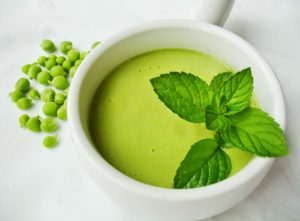
Lolo, my francophone, was busy fueling up for the morning’s slopes. She already knew the French phrase, she said.
I, of course, had never heard it so gave the words a little practice. “Aujourd’hui, Maman peut manger la soupe sur la tête de Lolo,” I said at the breakfast table in a ripe Anglo accent, ”mais bientôt, Lolo pourra manger la soupe sur la tête de Maman.” Today, I can eat soup on Lolo’s head, but soon. . . .
Yes, Lolo agreed. I had it right in all senses.
It was hardly the first time I’d heard food enter the French lexicon to describe a situation that had nothing to do with eating. In many ways it’s unsurprising. French food ranks among the finest in the world, and the pursuit of the Michelin star in this land often remains an elusive, life-long dream. France’s love affair with food filters into cooking and eating at less exalted levels, too.
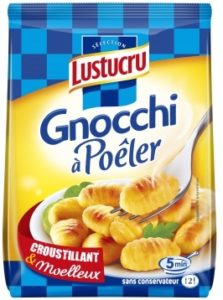
Last summer my friend Véro introduced Lolo to her favourite French meal, which centers on a store-bought package of Lustucru-brand Gnocchi à Poêler. I began making the gnocchi following the simple directions on the back of the bag. Melt butter in a frying pan; seal the potato dumplings on high heat; lower the heat and cover until the gnocchi are soft on the inside. Then, like Véro, I pair the pan-fried gnocchi with an egg over-easy. The yolk makes a perfect dip.
This summer I’ve learned that in a French household, even a simple recipe like this one deserves better. One evening as Véro whipped up a batch of Gnocchi à Poêler for her daughter and mine, she explained that I must prepare the pan with Such-and-Such, a blend of four particular oils.
I’d never heard of it.
And she insisted that the eggs must be fresh from the market that day.
A good North American, I store a dozen eggs in my fridge. Just in case I decide to make six batches of brownies. Or in case my family decides to pop in for breakfast from Chicago.
Food – whatever its level of splendour – is a big deal in France. It makes sense that this sentiment seeps into the language.
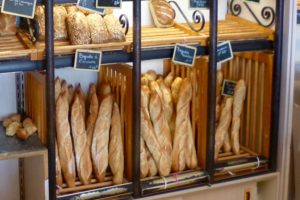
Take junk food. Larousse, a classic French dictionary, won’t even elevate “junk food” to phrase-status. To this publishing house, junk food is simply la nourriture de mauvaise qualité. Food of poor quality. Other dictionaries bestow junk food with the name la malbouffe, where mal is “bad” or “evil,” and bouffer is a more vulgar verb for “to eat” – more along the lines of “to chow down” or “to stuff yourself.” Or taking yet another tack: Manger des cochonneries means “to eat junk food” – while, just to cement the perception of the food category, dire des cochonneries is “to talk dirty.”
Food also cooks up some colourful French idioms:
“Je suis dans le potage,” Véro wrote to me in an email late one evening, knowing I’d like the turn of phrase. Fortunately she wasn’t sitting in a bowl of soup. I found a dictionary. She was merely in a bit of a mess.
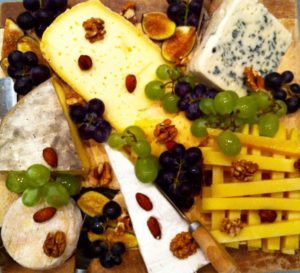
This beauty came up one day at my Alliance Française class in Toronto: Mettre les pieds dans le plat (“to put your feet in the dish (of food)”). It’s apparently the French way of putting your foot in your mouth. “Le plat is worse than la bouche,” Jean-François insisted. “You have to be supple.”
My long-time French instructor approaches his native tongue with an equal mix of love and irreverence. It spices up the classroom conversation – while sharing out an uncanny number of French phrases that involve food.
Mener à la baguette (“to lead with a long stick of French bread”) was a phrase Jean-François scrawled on the white board a while back. To boss someone around. I loved the imagery from the start. Only recently did I discover that a lesser-known meaning of baguette is “chopstick” – or, indeed, “baton.”
Boire le vin jusqu’à la lie (“to drink wine until the dregs”) is a particularly French way to prod someone to finish what they begin.
Jean-Francois’ personal favourite, I think, is un pot-de-vin (“a jar of wine”). More than once he has mentioned this peculiarly French way of saying “a bribe.”
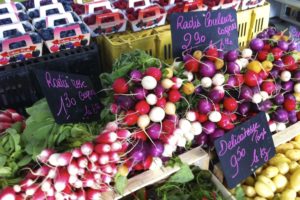
As wine and baguettes blend their way into French phraseology, we simply need the cheese. But worry not. En faire tout un fromage (“to make such a cheese”) is how the French make a mountain out of a molehill. It seems an odd way to sully the good name of cheese, but on introspection, calling your Anglophone boss “the big cheese” doesn’t make sense either. (In France, the boss is la grosse légume. The big vegetable.)
Meanwhile, the summer pushes on and Lolo continues to adore her gnocchi. And her sleep – lots of deep, dreaming sleep. Sprinkled with a healthy dose of exercise and Côte d’Azur sunshine, I fear my leggy tween will overtake my height before we return to Toronto for the start of school.
The last thing I’ll be offering her this summer in France, then, is soup. I don’t want to give her any ideas.
* * *
P.S. What French-language food phrases can you share?

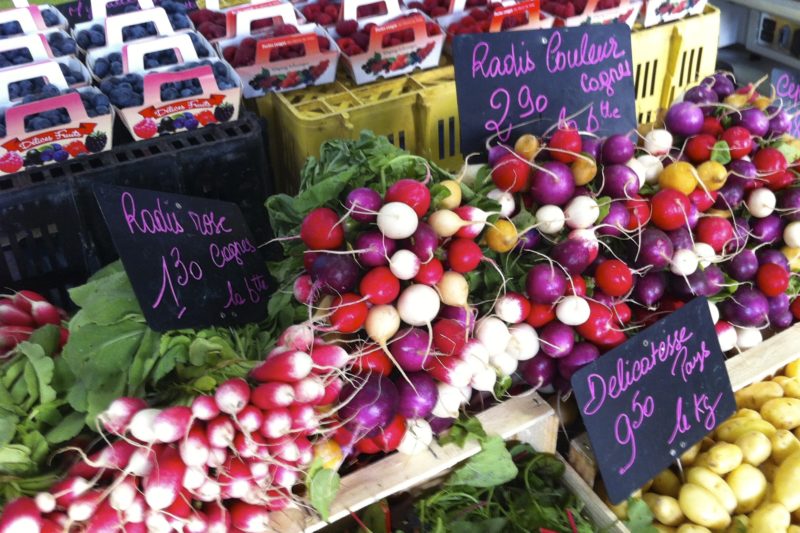
Love all these!!! What about to ‘ramer dans la choucroute’…to be up the creek without a paddle so to speak…
Wonderful essay. I love this one: avoir les oursins dans la poche (to have sea urchins in one’s pocket)…meaning one is cheap or stingy. But I had to laugh this morning, when my husband literally had a sea urchin in his pocket. We were out swimming when he caught it and saved it in his swim trunks, for lunch. Ouch!
…’On ne peut pas avoir le beurre, l’argent du beurre et la fille du fermier’….You can’t have it all!! Or what about this one, when you come into a little bit of unexpected money….’Ca met un peu de beurre dans les épinards’!
Loved this very flavorful edition of French Lessons although it made me a bit hungry reading it.
Il y a aussi cette version ” Avoir le pain l’argent du pain et le sourire du boulanger” J’aime bien te lire ,c’est un peu comme être en vacance avec vous
there are so many saying that uses food related words:
j’ai la moutarde qui me monte au nez: I’m getting mad
Être le dindon de la farce: to be the butt of the joke
Et les carottes sont cuites: there is no more hope
Ce n’est pas la fin des haricots! One of my faves meaning it’s not the end of the world! I loved revisiting and learning new food inspired french phrases, and hearing that Lolo is growing like a healthy flowering weed is fun too!!
Raconter des salades : Raconter des histoires + ou – fausses
Appuyer sur le champignon : Peser sur l’accélérateur
Ce n’est pas de vos oignons : Ça ne vous regarde pas
Très drôle…. Bonjour à tous
Ça part en sucette! It’s going to lollipops! My circus arts instructor says it all the time when things are going crazy!
Avancer comme un escargot
Avoir la pêche
C’est du gâteau
C’est la fin des haricots
C’est un navet
Casser du sucre sur le dos de quelqu’un
Casser la croûte
Des cheveux poivre et sel
En faire tout un fromage
En rester comme deux ronds de flan
Etre bête comme chou
Etre en rang d’oignons
Etre haut comme trois pommes
Etre muet comme une carpe
Etre rouge comme une écrevisse
Etre serrés comme des sardines (en boîte)
Etre une tête de lard
Faire chou blanc
Faire le poireau
Grandir comme une asperge
La moutarde me / te / lui / nous / vous / leur monte au nez
Manger les pissenlits par la racine
Marcher sur des œufs
Mettre du beurre dans les épinards
Ne pas gagner un radis
Prendre de la brioche
Sucrer les fraises
Tomber dans les pommes
Verser de l’huile sur le feu
La faim chasse le loup hors du bois. (Faire les choses sous la contrainte).
– Ventre affamé n’a pas d’oreille. (Il faut savoir choisir le bon moment pour parler).
– Faute de grives, on mange des merles. (Se contenter de ce que l’on a).
– Le vin est tiré, il faut le boire. (L’affaire est engagée, il faut continuer).
– Tous les goûts sont dans la nature. (Accepter les différences).
– Qui dort, dîne. (Le sommeil tient lieu de repas).
– Qui a bu, boira. (Il est difficile de se corriger d’un défaut devenu habitude).
– On ne fait pas d’omelette sans casser d’oeufs. (Pas de résultats sans peine ni sacrifice).
– Il y a loin de la coupe aux lèvres. (La distance entre un désir et sa réalisation peut être grande).
– Ne pas dire : Fontaine, je ne boirai pas de ton eau. (Ne jamais dire qu’on n’aura besoin de rien ni de personne).
– Donner un oeuf pour avoir un boeuf. (Faire les choses avec intérêt, donner peu pour avoir beaucoup).
– Au bon vin, bonne enseigne. (Ce qui est bon se reconnaît de soi-même).
– Du passé, faire table rase. (Oublier les mauvais jours et les rancoeurs, prendre un départ nouveau).
– Avoir les yeux plus grands que le ventre. (Ne pas connaître ses limites).
– La caque sent toujours le hareng. (Il est difficile de se libérer de son passé).
Manger son pain blanc
Ne pas mériter son pain
Bon comme du bon pain
Oter le pain de la bouche
Long comme un jour sans pain
Donner des coups de pied dans son pain
Passer pour une poire
Reconnaître l’arbre à ses fruits
Avoir du sang de navet
Se faire traiter de banane
Se faire traiter d’asperge,
Manger les pissenlits par la racine,
Se faire presser comme un citron,
Ramener sa fraise
– Mettre les petits plats dans les grands.
– Ne pas laisser tomber la mayonnaise.
– En faire ses choux gras.
– Être aux petits oignons.
– Passer à la moulinette.
– Recevoir une note salée.
– Se réserver une part du gâteau.
– Proposer du réchauffé.
– Sauter à la corde devant le buffet.
– Être serré comme des sardines dans la boîte.
– Servir un bouillon de 11 heures.
Et pour ceux qui veulent pousser plus loin il y a plus :
https://fr.wikipedia.org/wiki/Liste_d%27idiotismes_gastronomiques_fran%C3%A7ais
Il y a aussi les allemands qui ont une expression que j’aime beaucoup :
” stolzieren wie ein Stroch im Salat” : elle marche comme une cigogne dans la salade ( se dit d’une femme qui marche avec des talons de 25cm)
le génie d’une langue … on peut s’amuser longtemps
diane louise
GROS merci, Diane Louise! Test scheduled for all readers next week. And I’m handing you the pen for some post in the future! 🙂